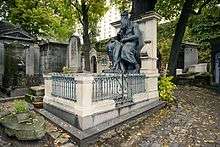Daniel Iffla

Daniel Iffla known as Osiris (1825 in Bordeaux, France - 1907 in Paris) was a financier and philanthropist.
Career
Born into a Jewish family of Moroccan origin, he made his fortune in Paris in the bank of Jules Mirès and Moses Polydore Millaud. It invested in the Spanish railways, which earned him the citation of the Order of Isabella.
He devoted himself to philanthropy after the death of his wife Leonie Carlier, a year after she gave birth to two children.
His obsession with philanthropy emerged from the Jewish tradition of the tzedakah (charity), republican values and the irrepressible desire to spread his wealth. He built a statue in honor of Joan of Arc in Nancy, and an impressive collection of Napoleonic relics, bequeathed to the Pasteur Institute.[1]
Disapproving of the conduct of his nieces, one of which was the mistress of Claude Debussy, he bequeathed his fortune to the Pasteur Institute (which used it in part to the creation of Radium Institute) as well as assorted other charitable institutions.[2]
Iffla built several synagogues in Paris, including the Buffault Synagogue[1] at Arcachon one in Tours and also the Vincennes Synagogue as well as synagogues in Tunis and Lausanne. In the latter city, he also constructed a statue of William Tell (in gratitude to the Swiss for their reception given of the army of Bourbaki in 1871).
His grave in Paris is white marble surmounted by a large bronze reproduction of Michelangelo's statue Moses, from the church San Pietro in Vincoli, Rome.
References
- 1 2 Pierre Assouline,The Last of Camondo, Gallimard, 1997, pp.104 to 106
- ↑ Hervé Lauwick, Sacha Guitry and women, Plon, 1965, pp.114 and 115
Notes
Bibliography
- Dominique Jarrassé,Osiris, patron Jewish nationalist French. Daniel Iffla (1825-1907).Editions of Aesthetic Miscellaneous, 2009.
External links
![]() Media related to Daniel Iffla at Wikimedia Commons
Media related to Daniel Iffla at Wikimedia Commons
- the origins of Social Security on the site of the National Museum of Health Insurance
- Radium Institute, a pioneer in the fight against cancer